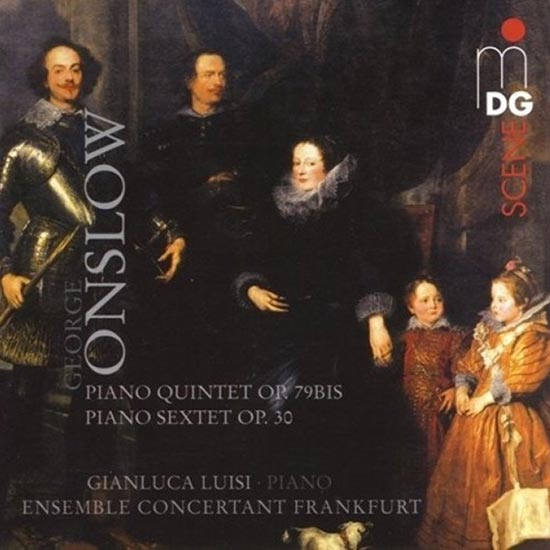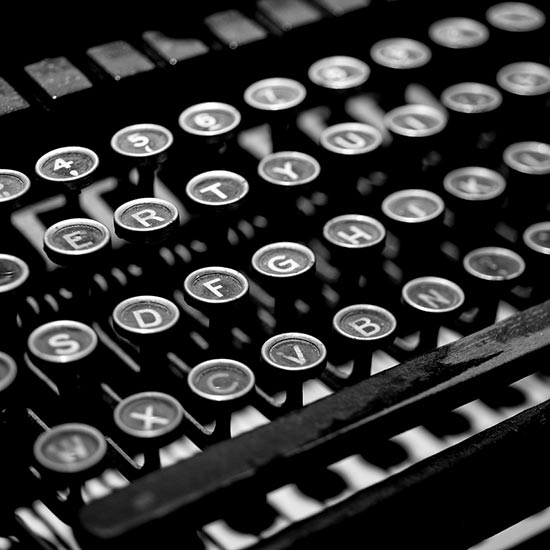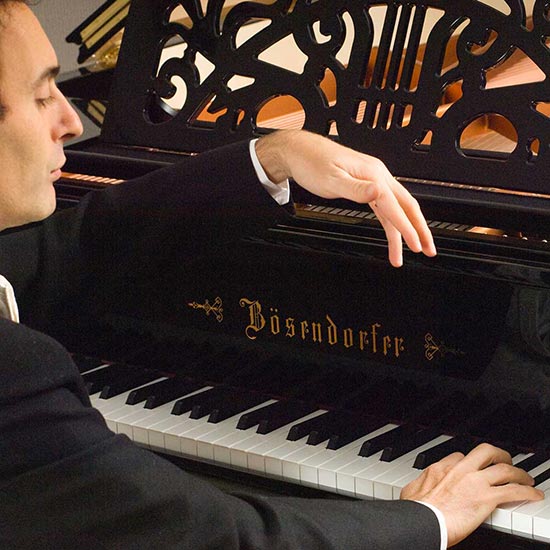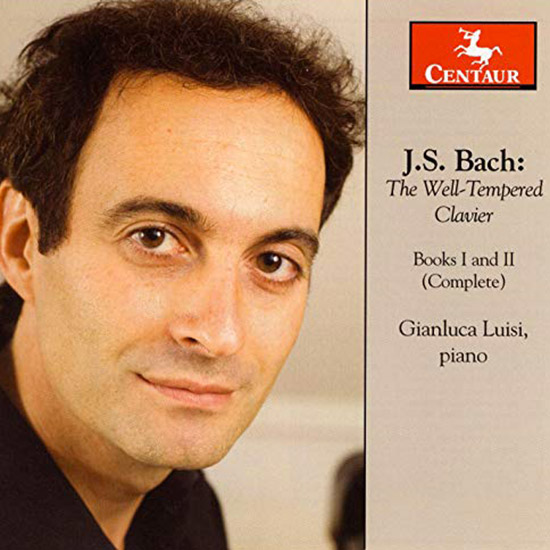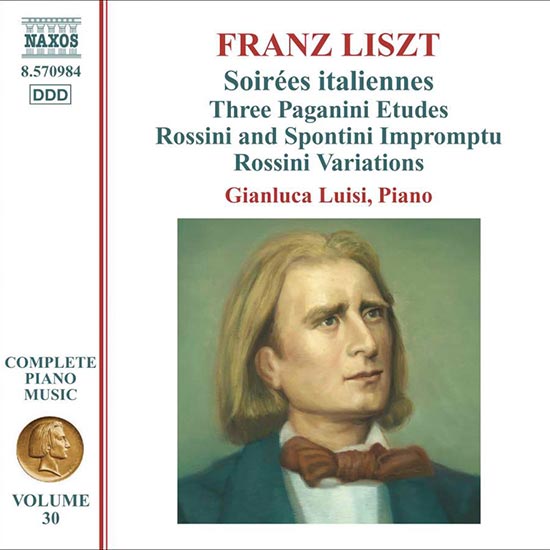THE CLASSICAL MUSIC GUIDE FORUMS – 13/06/2007
George Onslow’s name is not all that well known today, especially on the concert stage. On records, his works appear from time-to-time and then vanish for reasons I can’t understand. But here’s a disc that will, I’m sure, become a classic that will receive repeated listenings simply because the music is eminently listenable and enjoyable, highly romantic and individual, especially if you enjoy truly memorable music from this period.
The George Onslow story is quite interesting, as documented in MDG’s booklet. The father of George—Edward Onslow—an Englishman, was involved in the English parliament but due to a scandal, left England to make his home in France. There he married in 1783 and in 1784 the eldest son, George, was born. His father recognized the boy’s talents in both art and music, but particularly music. More problems arose in France for Edward for participating in the counter-revolutioin and assisting in the royalist movement. Thus he was exiled to Hamburg, Germany and took his son George. There George studied with Jan Ladislav Dussek, and upon returning to France, continued his studies with Johann Baptist Cramer. The names of Dussek and Cramer are, of course, well known in the annals of music history. George Onslow’s love for the piano was apparent to all those around him in music circles, and by such people as French composer Jacques Halévy.
Onslow wrote a good deal of solo piano music, but created some fine chamber music in the way of sextets, septets, quinets, all of which prominently featured the piano, which definitely plays the most prominent part in the two works on this new CD on the Dabringhaus und Grimm label from Germany. The Septet in E-flat Major, Op. 30 (1825) was dedicated to a near contemporary of Onslow’s, Johann Nepomuk Hummel, and is scored for piano, two violins, viola, cello and double-bass and times in at 35:26. The Quintet in B-flat Major, Op. 79bis (1849) is a takeoff of Onslow’s Septet, Op. 79; the scoring is different in the case of the piano, which is identical. This is scored for piano, violin, viola, cello, and double-bass. The only other work that would compare in stature and brilliance within the Onslow time frame would be Schubert’s “Trout” Quintet, especially with the inclusion of the double-bass, which was rare to have been heard in chamber music ensembles during this time.
The music is infectious, has a lovely lilting quality about it, but it is more than mere salon music. This is serious music composed by a composer who became highly respected during his lifetime. The balance between the strings and piano is especially noteworthy, but I still emphasize the placement of the piano, which is the undercurrent that keeps both of these works going. By the time the Quintet was composed, Onslow truly illustrated his brilliance as a pianist and composer.
This has been beautifully recorded by MDG, as is usual for any of their compact disc productions I’ve heard. The venue has especially fine acoustics in this June and December 2006 recording. Balances are exceptional. The Frankfurt Concertant Ensemble consists of Peter Agoston and Klaus Schwamm, violinists, Wolfgang Tluck, violist, Sabine Krams, cellist, and Timm-Johannes Trappe, double-bassist. I have also made the discovery of an absolutely brilliant pianist, Gianluca Luisi, who possesses a golden piano tone with a splendid technique to match.
Rare repertoire, superb performing artists, impeccable and very natural engineering, outstanding and informative notes about Onslow all make this a disc you won’t want to miss. Indeed, your appetite will be whetted in wanting to hear more of Onslow’s music.
Die Kammermusik von George Onslow scheint sich in letzter Zeit einer stetig wachsenden Beliebtheit zu erfreuen. Regelmäßig kommen Neuerscheinungen auf den Markt, die sich dem Schaffen des exzentrischen Aristokraten widmen. Auch das Ensemble Concertant Frankfurt legt nun beim MDG eine CD-Einspielung vor, die sich ausschließlich mit der Musik Onslows befasst.
Gerne wurde Onslow von seinen Zeitgenossen als ‚französischer Beethoven’ gefeiert. Er hatte sich hauptsächlich der Kammermusik verschrieben und komponierte zu einer Zeit fast ausschließlich Instrumentalwerke, als in Frankreich und besonders in Paris die Oper das Maß aller Dinge war. Doch Onslow ließ sich von Modeerscheinungen nie wirklich beeinflussen, sondern suchte als finanziell unabhängiger Privatier seinen eigenen Weg. So verbrachte er den Großteil seines Lebens auf seinem Landgut in Clermont, wo er weitläufige Ländereien unterhielt und bewirtschaftete. Mit seinem musikalischen Talent sah er sich in der Tradition des gebildeten Gentleman, zu dessen Ausbildung ganz selbstverständlich neben der Jagd, Sprachen und Mathematik auch die Musik gehörte. Seine außergewöhnliche Begabung auf dem Klavier nutzte er nur selten bei von ihm organisierten Wohltätigkeitskonzerten, die er regelmäßig in seinem Heimatort abhielt.
Nach einem Jagdunfall auf einem Ohr taub und von der Missachtung des Publikums schwer getroffen, verbrachte er seine letzten Jahre in zunehmender Depression und starb 1850 mit gerade einmal 66 Jahren. Bis in die heutige Zeit hat sich das Vorurteil gehalten, Onslow sei nur ein begabter Dilettant gewesen, dem als Beethoven-Epigone kein eigenständiger Platz im Konzertleben gebührt. Zum Glück gibt es aber in den letzten Jahren immer wieder Bestrebungen, diesen Missstand zu beheben und Onslow aus dem Schatten der Wiener Klassiker zu befreien. Denn seine Verdienste um die Kammermusik können nicht zu hoch eingeschätzt werden, so einfallsreich und stimmig ist sein Oeuvre.
Das hier eingespielte Sextett op.30 ist dem österreichischen Komponisten Johann Nepomuk Hummel gewidmet. Zwar ist heute nicht mehr zu rekonstruieren, ob sich die beiden Musiker auch persönlich gekannt haben, aber anhand der großen stilistischen Ähnlichkeit ihrer Arbeiten kann man immerhin ablesen, dass Onslow offenbar Hummels Kompositionen sehr genau studiert hatte. Das Werk vereint zwei recht unterschiedliche Charaktere in sich. Zum einen ist es von seiner Anlage her sehr konzertant. Zum anderen trägt es klar kammermusikalische Züge.
Sehr viel später entstand das Quintett op.79bis. Besonders bemerkenswert ist an dem Werk seine Instrumentierung mit Kontrabass, da diese Besetzungsform in der Geschichte der Gattung nur sehr selten vorkommt. Bekanntestes Beispiel dürfte Schuberts Forellenquintett sein, das sich aber von Onslows Werk schon allein dadurch unterscheidet, dass Onslow den Klavierpart auffallend virtuos hervorhebt, während dieser bei Schubert gleichberechtigt in das Ensemble eingebunden ist.
Das Ensemble Concertant Frankfurt und der Pianist Gianluca Luisi gestalten in ihrer Interpretation der beiden Werke einen sehr unterhaltsamen und abwechslungsreichen Onslow, der immer wieder überraschen kann. Ihr Spiel scheint wie aus einem Guss und bereitet dadurch viel Freude beim Zuhören. Luisi nutzt seinen Part zu brillanten Höhenflügen, doch stellt er seine Mitstreiter dabei nie in den Schatten. Peter Agoston und Klaus Schwamm (beide Violine), Wolfgang Tluck (Viola), Sabine Krams (Cello) sowie Timm-Johannes Trappe (Kontrabass) spielen sich mit viel Esprit die Bälle zu und lassen dabei niemals Langeweile aufkommen: eine rundum gelungene Produktion!


